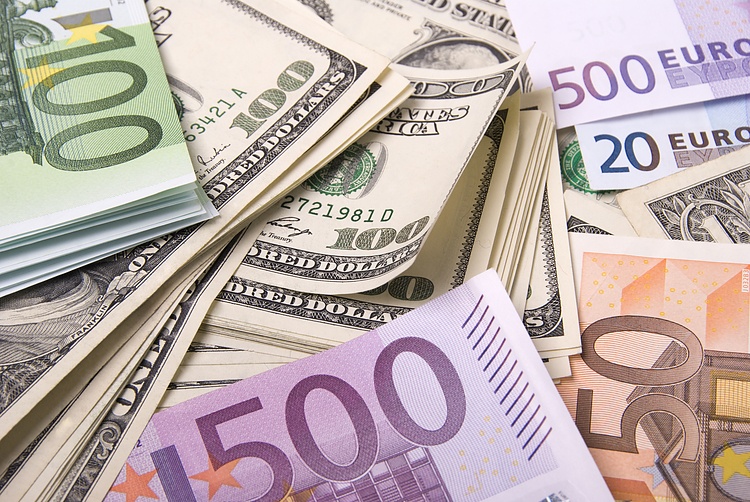- The Euro adds to recent losses against the US Dollar.
- European stocks open Thursday’s session in a mixed tone.
- Flash EMU CPI, US PCE, ECB Lagarde will take centre stage.
The Euro accelerates its losses against the US Dollar on Thursday, forcing EUR/USD to retreat further south of 1.1000 the figure and revisit the 1.0920 region, or weekly lows.
On the other hand, the Greenback picks up extra upside traction and lifts the USD Index (DXY) back above the 103.00 barrier against the backdrop of a mild recovery attempt in US yields across the curve.
Further weakness around the European currency came in response to disappointing figures from the German labour market, where the Unemployment Rate ticked higher to 5.9% in November and the Unemployment Change increased by 22K individuals.
The current setting for monetary policy retains an unchanged character, with investors factoring in the potential for prospective interest rate reductions by both the Federal Reserve (Fed) and the European Central Bank (ECB) in the spring of 2024.
Extra data releases in Europe will see the publication of advanced inflation readings for the euro bloc for the month of November along with the Unemployment Rate. In addition, ECB’s President Christine Lagarde will speak at an event in Frankfurt.
In the US, inflation measured by the PCE and Core PCE will be the salient event, seconded by the usual weekly Initial Jobless Claims, Personal Income, Personal Spending and Pending Home Sales.
Daily digest market movers: Euro comes under pressure on data, USD recovery
- The EUR faces extra downside against the USD.
- US and German yields trade in a mixed fashion.
- Markets see the Fed trimming its interest rates in Q2 2024.
- Investors also expect the ECB to start reducing its rates in H1 2024.
- BoJ’s Nakamura said negative rates and YCC are still necessary.
- Lagarde will speak on “Europe: Banking on resilience”.
Technical Analysis: Euro faces a key support at the 200-day SMA
The acceleration of the downward trend sees EUR/USD retreating to the 1.0920 zone on Thursday, adding to Wednesday’s retracement.
Further weakness could see EUR/USD challenging the key 200-day SMA at 1.0816, ahead of the provisional 55-day SMA at 1.0676. Down from here emerges the weekly low of 1.0495 (October 13) prior to the 2023 low of 1.0448 (October 3) and the round level of 1.0400.
In case bulls regain the upper hand, the pair is expected to meet the next up-barrier at the November high of 1.1017 (November 29) ahead of the August top of 1.1064 (August 10) and another weekly peak of 1.1149 (July 27), all of which precede the 2023 high of 1.1275 (July 18).
Meanwhile, the pair is seen maintaining its constructive outlook while above the 200-day SMA.
Euro FAQs
The Euro is the currency for the 20 European Union countries that belong to the Eurozone. It is the second most heavily traded currency in the world behind the US Dollar. In 2022, it accounted for 31% of all foreign exchange transactions, with an average daily turnover of over $2.2 trillion a day.
EUR/USD is the most heavily traded currency pair in the world, accounting for an estimated 30% off all transactions, followed by EUR/JPY (4%), EUR/GBP (3%) and EUR/AUD (2%).
The European Central Bank (ECB) in Frankfurt, Germany, is the reserve bank for the Eurozone. The ECB sets interest rates and manages monetary policy.
The ECB’s primary mandate is to maintain price stability, which means either controlling inflation or stimulating growth. Its primary tool is the raising or lowering of interest rates. Relatively high interest rates – or the expectation of higher rates – will usually benefit the Euro and vice versa.
The ECB Governing Council makes monetary policy decisions at meetings held eight times a year. Decisions are made by heads of the Eurozone national banks and six permanent members, including the President of the ECB, Christine Lagarde.
Eurozone inflation data, measured by the Harmonized Index of Consumer Prices (HICP), is an important econometric for the Euro. If inflation rises more than expected, especially if above the ECB’s 2% target, it obliges the ECB to raise interest rates to bring it back under control.
Relatively high interest rates compared to its counterparts will usually benefit the Euro, as it makes the region more attractive as a place for global investors to park their money.
Data releases gauge the health of the economy and can impact on the Euro. Indicators such as GDP, Manufacturing and Services PMIs, employment, and consumer sentiment surveys can all influence the direction of the single currency.
A strong economy is good for the Euro. Not only does it attract more foreign investment but it may encourage the ECB to put up interest rates, which will directly strengthen the Euro. Otherwise, if economic data is weak, the Euro is likely to fall.
Economic data for the four largest economies in the euro area (Germany, France, Italy and Spain) are especially significant, as they account for 75% of the Eurozone’s economy.
Another significant data release for the Euro is the Trade Balance. This indicator measures the difference between what a country earns from its exports and what it spends on imports over a given period.
If a country produces highly sought after exports then its currency will gain in value purely from the extra demand created from foreign buyers seeking to purchase these goods. Therefore, a positive net Trade Balance strengthens a currency and vice versa for a negative balance.
Read the full article here

